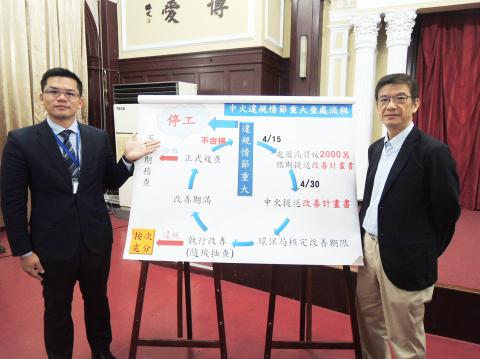The Taichung City Government yesterday fined the Taichung Power Plant NT$20 million (US$647,962) for poor management of industrial wastewater.
The Taichung Environmental Protection Bureau gave the coal-fired plant until April 30 to come up with a proposal to ameliorate the situation, bureau Director-General Wu Chih-chao (吳志超) said in a statement posted on the city government’s Web site.
The plant, which is run by state-owned Taiwan Power Co (Taipower, 台電), was fined in accordance with Section 40 of the Water Pollution Control Act (水污染防治法), Wu said.

Photo: CNA
It is the highest fine ever imposed on a state-owned enterprise, the statement said.
A test conducted on March 21 by the bureau found that wastewater from the plant’s No. 1 to No. 4 generators contained nitrate nitrogen levels that exceeded the allowable limit, Wu said.
Two other tests carried out earlier this year on generators No. 5 to No. 8 also turned up levels that exceeded the limit, he said.
Taipower in a statement said that high nitrate nitrogen levels were mainly caused by the plant’s focus on preventing air pollution, resulting in a lack of capacity to manage water pollution.
The utility said it respects the city government’s decision.
“We need to resolve the problem of wastewater first. We have yet to discuss whether to appeal the fine,” Taipower spokesman Hsu Tsao-hua (徐造華) told the Taipei Times by telephone.
The company must pay the fine by May 15, the Chinese-language Liberty Times (sister newspaper of the Taipei Times) reported, citing Taichung Information Bureau Director-General Wu Huang-sheng (吳皇昇).
To demonstrate its willingness to lower nitrate nitrogen levels in wastewater, the plant has halved the output of generators No. 1 to No. 4, Taipower said.
The plant has also readjusted an operating meter for flue gas desulfurization equipment to reduce the level of nitrogen oxides, it said, adding that round-the-clock supervision of the generators is being enforced to regulate the quantity of ammonia injection.
Generator No. 4 would be shut down to test equipment and improve wastewater management, Taipower said, adding that adjustments would be made to generator No. 3 to improve air pollution controls.
Taipower reiterated the importance of the plant, which it said plays a key role in ensuring a steady power supply for the nation.
The timing for the generators to return to normal generation levels would depend on wastewater conforming to regulations, it said.
The company said it hopes that improvements to the plant’s wastewater management could be made by early next month, as the nation’s electricity consumption is to greatly increase afterward.
It would maintain a low operating reserve margin of 6 percent over the next 10 days, as there have been no forecasts of abnormally hot weather, Taipower said, adding that and adjustments would be made according to the weather and electricity consumption.

PATENTS: MediaTek Inc said it would not comment on ongoing legal cases, but does not expect the legal action by Huawei to affect its business operations Smartphone integrated chips designer MediaTek Inc (聯發科) on Friday said that a lawsuit filed by Chinese smartphone brand Huawei Technologies Co (華為) over alleged patent infringements would have little impact on its operations. In an announcement posted on the Taiwan Stock Exchange, MediaTek said that it would not comment on an ongoing legal case. However, the company said that Huawei’s legal action would have little impact on its operations. MediaTek’s statement came after China-based PRIP Research said on Thursday that Huawei filed a lawsuit with a Chinese district court claiming that MediaTek infringed on its patents. The infringement mentioned in the lawsuit likely involved

Taipei is today suspending work, classes and its US$2.4 trillion stock market as Typhoon Gaemi approaches Taiwan with strong winds and heavy rain. The nation is not conducting securities, currency or fixed income trading, statements from its stock and currency exchanges said. Authorities had yesterday issued a warning that the storm could affect people on land and canceled some ship crossings and domestic flights. Taiwan Semiconductor Manufacturing Co (TSMC, 台積電) expects its local chipmaking fabs to maintain normal production, the company said in an e-mailed statement. The main chipmaker for Apple Inc and Nvidia Corp said it has activated routine typhoon alert

GROWTH: TSMC increased its projected revenue growth for this year to more than 25 percent, citing stronger-than-expected demand for AI devices and smartphones The Taiwan Institute of Economic Research (TIER, 台灣經濟研究院) yesterday raised its forecast for Taiwan’s GDP growth this year from 3.29 percent to 3.85 percent, as exports and private investment recovered faster than it predicted three months ago. The Taipei-based think tank also expects that Taiwan would see a 8.19 percent increase in exports this year, better than the 7.55 percent it projected in April, as US technology giants spent more money on artificial intelligence (AI) infrastructure and development. “There will be more AI servers going forward, but it remains to be seen if the momentum would extend to personal computers, smartphones and

Catastrophic computer outages caused by a software update from one company have once again exposed the dangers of global technological dependence on a handful of players, experts said on Friday. A flawed update sent out by the little-known security firm CrowdStrike Holdings Inc brought airlines, TV stations and myriad other aspects of daily life to a standstill. The outages affected companies or individuals that use CrowdStrike on the Microsoft Inc’s Windows platform. When they applied the update, the incompatible software crashed computers into a frozen state known as the “blue screen of death.” “Today CrowdStrike has become a household name, but not in